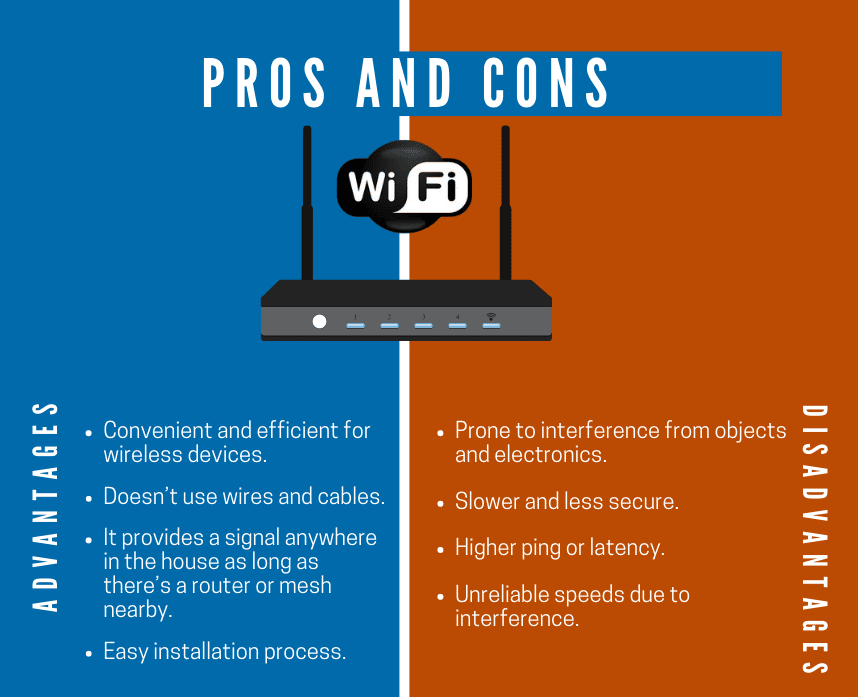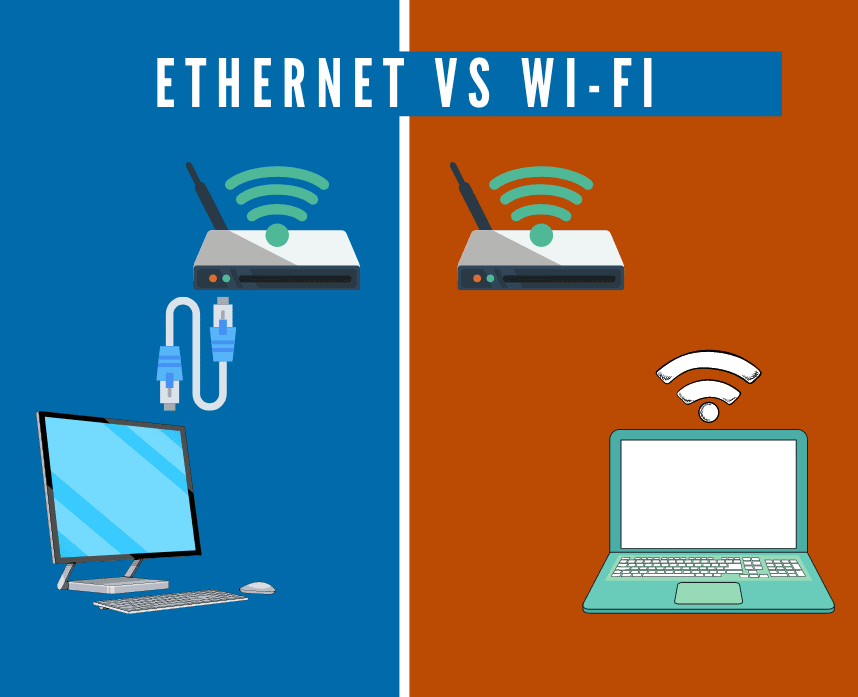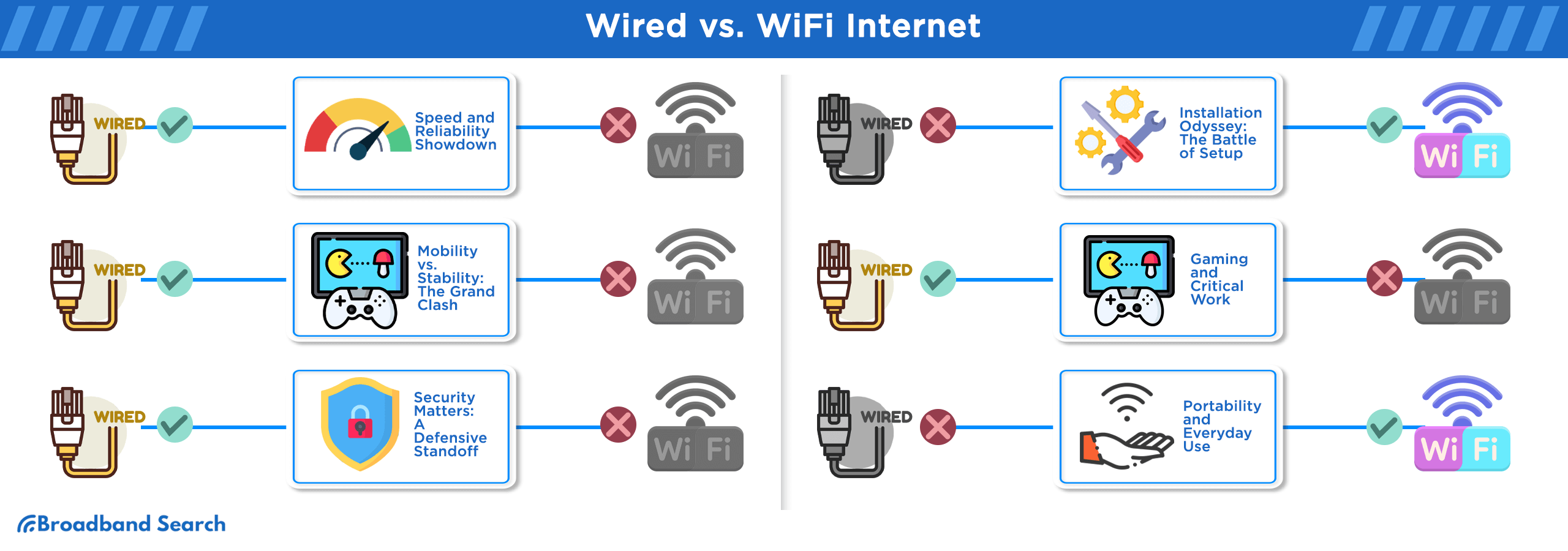Wonderful Info About Is A Wired Connection Faster Than WiFi

Vs WiFi Which One Offers Faster Connections For
Is a Wired Connection Really Faster Than WiFi? Let's Untangle the Web
1. Speed Demons
So, you're staring at that buffering wheel again, contemplating whether to chuck your router out the window. The age-old question pops up: is a wired connection actually faster than WiFi? Well, buckle up, because we're about to dive into the sometimes-confusing, often-frustrating world of internet speeds. Let's find out whether you should invest in that long Ethernet cable, or if you can stick with your wireless setup.
Think of it this way: a wired connection is like having a direct, private pipeline straight to your internet source. Nobody else is using it, nobody's interfering. It's a dedicated lane on the information highway. WiFi, on the other hand, is more like a crowded public road. Everyone's trying to get somewhere, and sometimes, things get a little congested. That congestion, my friend, translates to slower speeds and potential hiccups.
But it's not always that simple. Modern WiFi technology has come a long way, and in some cases, the difference might not be as drastic as you think. Factors like the type of WiFi router you have, the distance from the router, and the number of devices connected all play a role. It's a bit of a technological balancing act, honestly.
However, in general, a wired connection, specifically Ethernet, offers lower latency and a more stable connection, especially for bandwidth-intensive activities such as online gaming, video conferencing, and large file downloads. So, if you're a serious gamer, or someone who relies on a rock-solid connection for work, a wired setup is probably your best bet. It's the internet equivalent of showing up early to beat the crowds.

Decoding the Speeds
2. The Ins and Outs of Internet Performance
Okay, so we know that wired generally wins the speed race. But what makes one connection faster than another? It's not just magic (though sometimes it feels like it!). Several factors contribute to the speed you experience, both with wired and wireless connections. Understanding these factors can help you optimize your setup and get the most out of your internet service.
First, let's talk about your internet plan. No matter how fancy your router or how long your Ethernet cable, you're limited by the speed you're paying for. If you're on a basic plan with slower speeds, you won't suddenly get lightning-fast performance just by plugging in a cable. It's like trying to pour a gallon of water through a garden hose — the hose size limits the flow, regardless of how much water you have available.
Then there's the router itself. Older routers, especially those using older WiFi standards (like 802.11g or n), simply can't keep up with modern internet speeds. Upgrading to a newer router that supports the latest WiFi standards (like 802.11ac or ax, also known as WiFi 5 and WiFi 6 respectively) can make a huge difference, even with WiFi. A good router is the traffic cop of your network, directing data efficiently.
Finally, interference plays a big role, especially with WiFi. Things like microwave ovens, cordless phones, and even other WiFi networks can interfere with your signal, slowing things down. Try to keep your router away from these sources of interference. Think of it like trying to have a conversation in a crowded room — the more noise, the harder it is to hear.
![[DIAGRAM] Bridging Routers Diagrams [DIAGRAM] Bridging Routers Diagrams](https://www.cables.com/blogimages/connecting-modem-to-wifi-router-cables-dot-com_1562729803.jpg)
[DIAGRAM] Bridging Routers Diagrams
WiFi's Comeback
3. Wireless Wonders
Don't write off WiFi just yet! As mentioned earlier, WiFi technology has evolved dramatically over the years. Modern WiFi standards like WiFi 6 (802.11ax) offer significantly faster speeds, improved capacity, and better performance in crowded environments compared to older standards. This means that in some cases, a modern WiFi connection can rival a wired connection, especially for everyday tasks like browsing the web and streaming videos.
One of the key improvements in newer WiFi standards is the use of multiple antennas and advanced technologies like MU-MIMO (Multi-User, Multiple-Input, Multiple-Output). This allows the router to communicate with multiple devices simultaneously, rather than taking turns, which greatly improves overall network performance. It's like having multiple lanes on that crowded highway, allowing more traffic to flow smoothly.
However, even with the latest WiFi technology, distance and obstacles still play a role. The further you are from the router, and the more walls and other obstructions between you and the router, the weaker the signal will be. This can lead to slower speeds and unreliable connections. Consider using a WiFi extender or mesh network to improve coverage in larger homes or areas with thick walls.
The choice between wired and WiFi really comes down to your specific needs and circumstances. If you're looking for the absolute fastest and most reliable connection, especially for demanding applications like gaming or video editing, a wired connection is still the way to go. But for everyday use, modern WiFi can often provide a perfectly acceptable experience.

Practical Tips for Optimizing Your Connection
4. Boosting Your Bandwidth
Alright, regardless of whether you're rocking a wired or wireless setup, there are things you can do to squeeze every last bit of performance out of your connection. It's like fine-tuning a race car — small adjustments can make a big difference.
First, make sure your router's firmware is up to date. Router manufacturers regularly release firmware updates that improve performance, security, and stability. Think of it as giving your router a software tune-up. You can usually update your router's firmware through its web interface. Check your router's manual for instructions.
Next, consider the placement of your router. As mentioned earlier, keep it away from sources of interference and place it in a central location in your home to maximize coverage. Elevating your router can also help improve signal strength. Imagine your router as a lighthouse — the higher it is, the further its signal can reach.
Finally, close any unnecessary applications or devices that are using bandwidth. Even if you're not actively using an application, it may be consuming bandwidth in the background. Close these applications to free up bandwidth for the tasks that matter most. It's like turning off the lights in rooms you're not using — it saves energy (or in this case, bandwidth!).
For wired connections, ensure your Ethernet cables are in good condition and properly connected. Damaged cables can degrade performance. Also, consider using Cat6 or Cat6a cables for faster speeds, especially if you have a Gigabit internet connection. It's the difference between a narrow dirt road and a wide, smooth highway.

Exploring Wired Vs. WiFi Comparison And Trends BroadbandSearch
Wired vs. WiFi
5. Making the Call
So, after all that, which is better: wired or WiFi? The answer, as is often the case, is "it depends." For sheer speed and reliability, wired connections still reign supreme. If you need the absolute best performance for gaming, video editing, or other demanding applications, plug in that Ethernet cable. It's the dependable workhorse of the internet world.
However, modern WiFi is perfectly adequate for most everyday tasks. If you're primarily browsing the web, streaming videos, or checking email, a good WiFi connection will likely be more than sufficient. Plus, WiFi offers the convenience of mobility, allowing you to connect from anywhere in your home without being tethered to a cable. It's the freedom fighter of internet connections.
Consider your specific needs and priorities. If you value speed and reliability above all else, go wired. If you value convenience and mobility, WiFi might be the better choice. Or, you could do what I do and have both! Use a wired connection for your desktop and a WiFi connection for your laptop and mobile devices. It's the best of both worlds!
Ultimately, the choice is yours. But hopefully, this article has shed some light on the differences between wired and WiFi connections and helped you make a more informed decision. Now, go forth and conquer the internet! And may your buffering wheels be few and far between.

FAQ
6. Your Burning Questions Answered
Still have questions? Don't worry, we've got you covered. Here are some frequently asked questions about wired and WiFi connections:
Q: Will switching to a wired connection dramatically improve my internet speed?
A: It depends on your current WiFi setup and internet plan. If you have an older router, are far from the router, or experience a lot of interference, switching to a wired connection could make a noticeable difference. However, if you already have a modern WiFi router and a strong signal, the improvement might be less dramatic. The best way to find out is to test your speed with both wired and wireless connections.
Q: Is there a difference in security between wired and WiFi connections?
A: Generally, wired connections are considered more secure than WiFi connections. With a wired connection, someone would need physical access to your network to intercept your data. With WiFi, your data is transmitted wirelessly, making it potentially vulnerable to interception if your network is not properly secured. Always use a strong password and enable WPA3 encryption on your WiFi router to protect your network.
Q: Can I use both wired and WiFi connections on the same device?
A: Yes, most devices (like laptops and desktops) can support both wired and WiFi connections simultaneously. You can choose which connection to use based on your needs and preferences. Some devices even allow you to prioritize one connection over the other. This can be useful if you want to use a wired connection for demanding tasks and WiFi for everything else.
Q: What are the benefits of using a mesh WiFi system?
A: Mesh WiFi systems use multiple nodes placed around your home to create a single, unified WiFi network with seamless coverage. This eliminates dead zones and provides a more consistent connection throughout your home, especially in larger homes or those with thick walls. Mesh systems are often easier to set up and manage than traditional WiFi extenders.